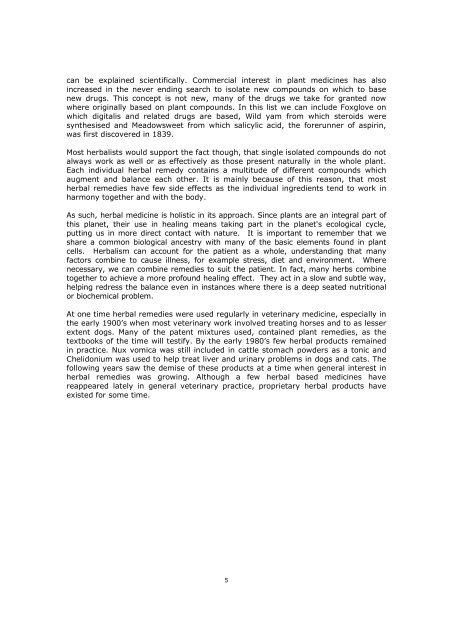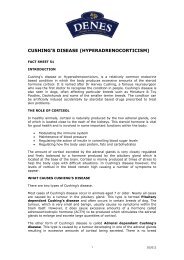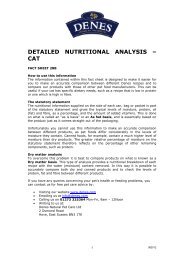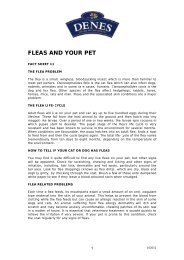VETERINARY HERBAL MEDICINE - Denes Natural Pet Care
VETERINARY HERBAL MEDICINE - Denes Natural Pet Care
VETERINARY HERBAL MEDICINE - Denes Natural Pet Care
Create successful ePaper yourself
Turn your PDF publications into a flip-book with our unique Google optimized e-Paper software.
can be explained scientifically. Commercial interest in plant medicines has also<br />
increased in the never ending search to isolate new compounds on which to base<br />
new drugs. This concept is not new, many of the drugs we take for granted now<br />
where originally based on plant compounds. In this list we can include Foxglove on<br />
which digitalis and related drugs are based, Wild yam from which steroids were<br />
synthesised and Meadowsweet from which salicylic acid, the forerunner of aspirin,<br />
was first discovered in 1839.<br />
Most herbalists would support the fact though, that single isolated compounds do not<br />
always work as well or as effectively as those present naturally in the whole plant.<br />
Each individual herbal remedy contains a multitude of different compounds which<br />
augment and balance each other. It is mainly because of this reason, that most<br />
herbal remedies have few side effects as the individual ingredients tend to work in<br />
harmony together and with the body.<br />
As such, herbal medicine is holistic in its approach. Since plants are an integral part of<br />
this planet, their use in healing means taking part in the planet's ecological cycle,<br />
putting us in more direct contact with nature. It is important to remember that we<br />
share a common biological ancestry with many of the basic elements found in plant<br />
cells. Herbalism can account for the patient as a whole, understanding that many<br />
factors combine to cause illness, for example stress, diet and environment. Where<br />
necessary, we can combine remedies to suit the patient. In fact, many herbs combine<br />
together to achieve a more profound healing effect. They act in a slow and subtle way,<br />
helping redress the balance even in instances where there is a deep seated nutritional<br />
or biochemical problem.<br />
At one time herbal remedies were used regularly in veterinary medicine, especially in<br />
the early 1900’s when most veterinary work involved treating horses and to as lesser<br />
extent dogs. Many of the patent mixtures used, contained plant remedies, as the<br />
textbooks of the time will testify. By the early 1980’s few herbal products remained<br />
in practice. Nux vomica was still included in cattle stomach powders as a tonic and<br />
Chelidonium was used to help treat liver and urinary problems in dogs and cats. The<br />
following years saw the demise of these products at a time when general interest in<br />
herbal remedies was growing. Although a few herbal based medicines have<br />
reappeared lately in general veterinary practice, proprietary herbal products have<br />
existed for some time.<br />
5










